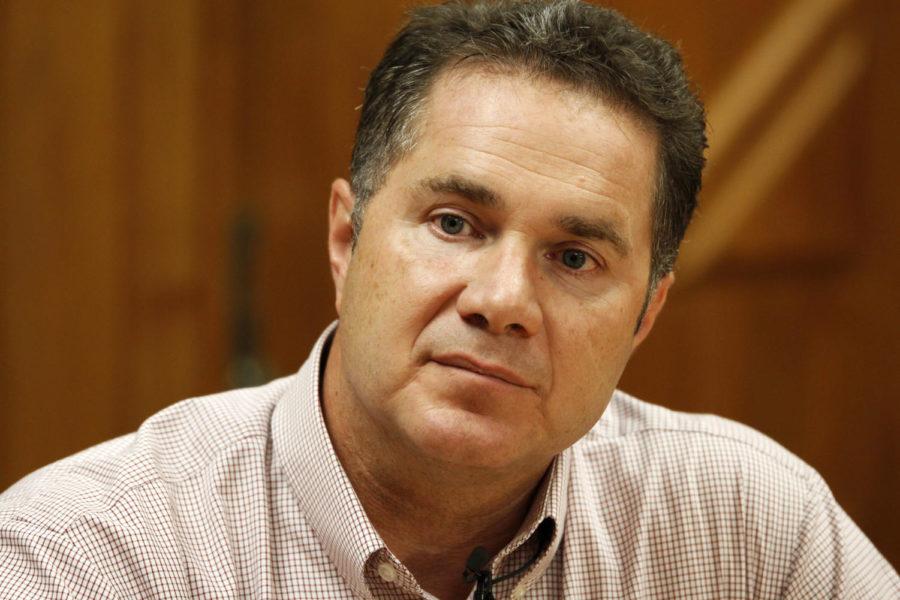Glawe: Don’t be distracted by mistakes
Jonathan Krueger/Iowa State Daily
Rep. Bruce Braley (D), a contender for Sen. Tom Harkin’s (D) soon to be vacated seat, is the latest victim of the petty “gotcha” universe. llege students, Nov. 6.
April 17, 2014
I vividly remember waking up on a mid-September day of the 2012 election cycle, steeped in the frenzy of voter turnout, and hearing Mitt Romney’s politically suicidal comment about the 47 percent. I declared, as many did, that that statement would single-handedly lose him the elections. Presumably, the polls would have shown faltering support for Mr. Romney, but, as statistician Nate Silver noted, the polls barely moved.
Rightly so, a political gaffe should not determine an election — ever. Our much-heralded statistician, though, thinks this may not be the case for local elections. Since in local elections the candidates are often unfamiliar to the electorate — isn’t there something strikingly sad about that — a simple gaffe may represent a first impression; voters draw conclusions from that impression, and those conclusions determine the vote.
That should never be the case but with the “mass media” tainted by forced hysteria and drama combined with an increasingly credulous voting base, we are left with hasty decision-making.
Iowa’s very own Rep. Bruce Braley-D, a contender for Sen. Tom Harkin’s-D soon to be vacated seat, is the latest victim of the petty “gotcha” universe. In the same fashion as the infamous “47 percent” gaffe, a video released by Republican operatives showed Bruce Braley claiming to have a stronger resume than Sen. Grassley-R for the chair of the Senate Judiciary Committee. The claim was a slight to farmers, favoring lawyers instead — not exactly the best comment to make in a state that is identified by its tradition for agriculture.
Rep. Braley quickly apologized to Sen. Grassley, speedily acknowledging his wrongdoing. That has not deterred his opposition from capitalizing upon the mistake, which is not surprising since his opponents are relatively unknown and have nothing much to build their campaigns upon.
But the salient point is that Braley’s regrettable slip-up should not determine his electability — as it shouldn’t for any candidate. Politicians are not perfect — that’s an understatement — and constituents really should nix the hasty presumptions made about their representatives. We should judge our leaders by their body of work, not by their shortcomings.
The journalist Michael Kinsley once pondered, “Why should something a politician says by accident automatically be taken as a better sign of his or her real thinking than something he or she says on purpose?”
The answer, I think, is quite easy: voters are easily swung by news headlines and catchphrases and not by the substance of policy. When voters are talking amongst themselves, catchphrases and gaffes are far easier to sling around than spelunking the depths of legislation.
This isn’t to insult the intelligence of the average voter, of course, but it is a problem.
Kinsley further explains that much of the responsibility for the frivolity in taking a gaffe to heart falls upon political journalism. “But campaign mechanics make for preferable subject matter. And the ideal ‘text’ for political journalism to chew on is an episode of no real meaning or importance.”
In essence, the U.S. is mired by a perpetual election cycle, and in order to feed the engines of interest, journalists and political opponents are constantly on the look out for a slip-up. Rest assured, voters will be quickly reminded of one mistakenly uttered sentence over dozens of genuine and substantial statements.
So who’s at fault? The fingers point toward the media, whose objective is to inform and “mediate” between government and its citizens — the prefix “medi” comes to mind — rather than formulate wild conclusions based off of snippets of information. That objective reserves no spot for fabricated drama, either.
The rhetoric and manner in which we conduct our political discourse has fundamentally changed — especially with the rise of the twenty-four hour news cycle. Politicians and their staffs are obsessively cautious about what they say and do because mistakes, even the simplest ones, are not so easily dismissed.
As Kinsley wrote, “It used to be, there was truth and there was falsehood. Now there is spin and there are gaffes.” Nowadays, amid the white noise of pandering and “gotcha” politicking, we really can’t tell what the truth is anymore. Should we take what a politician says to heart? Which words should be taken seriously, and which shouldn’t?
The answers are never easy.
Well, what is the truth about Rep. Braley, pointless gaffes aside? He has introduced legislation to address sexual harassment in the military, made adoption more affordable and worked extensively to transition returning soldiers back into society. The full list of provisions is too lengthy to cite.
Most importantly, Rep. Braley has consistently defended Iowa farmers, pushed for a long-term extension of the Farm Bill and steadfastly opposed regulations that hurt family agriculture. These can hardly count as slights to the average Iowa farmer.
The real Congressman Braley, not the one being defined by a silly gaffe, has my vote.







